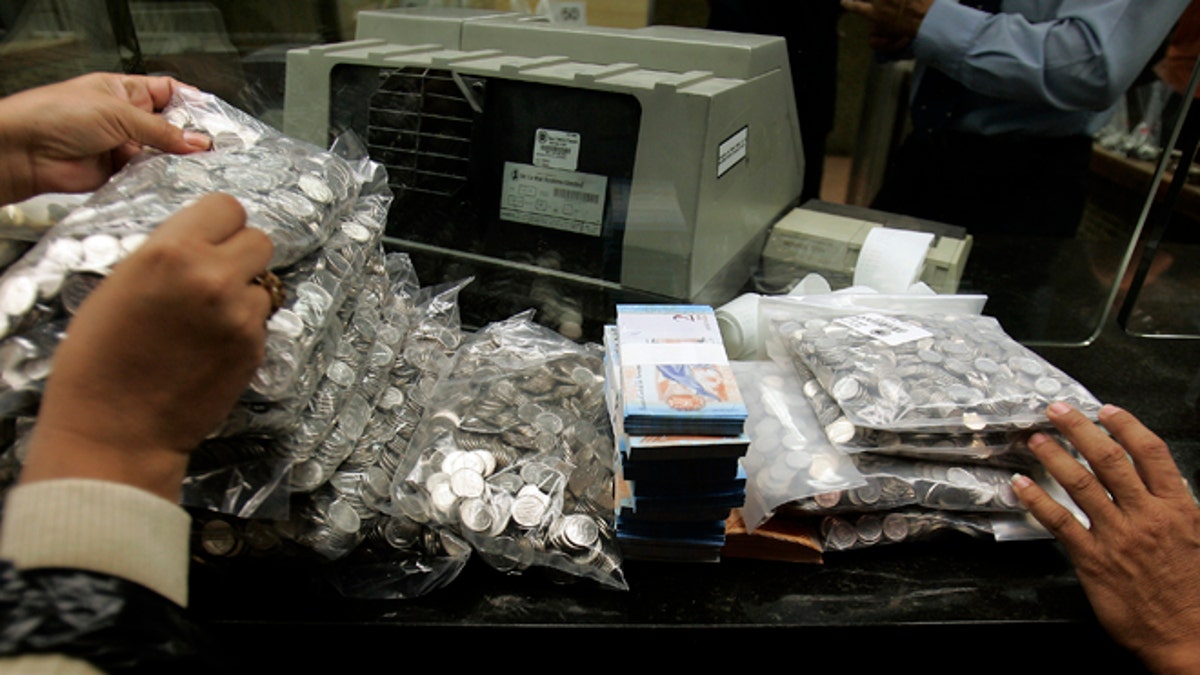
FILE - This Jan. 4, 2008 file photo shows bank workers handling Venezuela's currency, the "Bolivar Fuerte," or Strong Bolivar, at the Central Bank in Caracas, Venezuela. Venezuelans are expressing disbelief as the countrys currency has lost a quarter of its value on the black market in the space of a week in 2015, between May 14 and 22. (AP Photo/Fernando Llano, File)
CARACAS, Venezuela (AP) – Venezuelans are dumping their rapidly-depreciating currency at a quicker pace, leading to a staggering plunge in its free-market value, as the crisis-plagued economy edges closer to an outbreak of hyperinflation.
DolarToday, a widely followed website that tracks exchanges made near the Colombian border, reported Friday that the bolivar had lost a quarter of its value over the last seven days.
Everyone in smartphone-obsessed Caracas seemed to learn of the crash at the same time as the DolarToday app, a ubiquitous tool in the South American country, sent out a series of messages announcing the new rates under the headline "hyperinflation!"
Venezuelan currency was trading at around 420 bolivars per dollar Friday afternoon, according to the site. That was down from 300 bolivars per dollar on May 14 and 173 at the start of the year.
Many black market dealers paused transactions until the rate stabilized, but some Venezuelans said they had changed money at the 400 bolivar rate Friday.
It's not immediately clear what triggered the latest bout of panic buying and selling. But for many Venezuelans, who have lost faith in their currency, the dollar is the best way to protect themselves from inflation, which last year hit 68 percent and which economists say has already soared past the triple-digit threshold this year.
A Barclay Capital Inc. report issued Friday pointed to government expansion of the money supply as an underlying cause for inflation. The bank projected the Bolivar could dip as low as 600 to the dollar this year.
"We do not see any signal of change from the authorities but these risks should make them reconsider their policies," the report said.
The administration of President Nicolás Maduro keeps tight control over the legal exchange of bolivars, using a byzantine three-tier system. The system is meant to subsidize crucial imports, but also has led to widespread corruption and speculation.
One official rate is 6.3 bolivars per dollar. The weakest official rate, which was billed as an alternative to illegal currency exchanges when it was rolled out earlier their year, has inched up to 200 bolivars per dollar. The fact many people are willing to pay double that on the black market indicates the supply of dollars is limited.
The Maduro administration has been hoarding dollars as it grapples with falling oil prices. That has contributed to shortages and other economic distortions.
DolarToday is openly hostile to the socialist government and frequently picks up articles attacking the administration. But the site insists its exchange-rate reports are based on actual trades at the border and are not manipulated to undercut the government.
In April, Maduro repeated his assertion that the site's shadowy managers, whose identities are not public, are collaborating with the speculators and opposition leaders he blames for the country's problems. He accused them of purposely sowing chaos and promised to have them arrested.
"We're going to put those people at DolarToday who are waging an economic war against Venezuela behind bars sooner rather than later" he said.
The site, which is sometimes blocked within Venezuela, responded with a cheeky video documenting its popularity set to the club hit "Turn Down for What."
